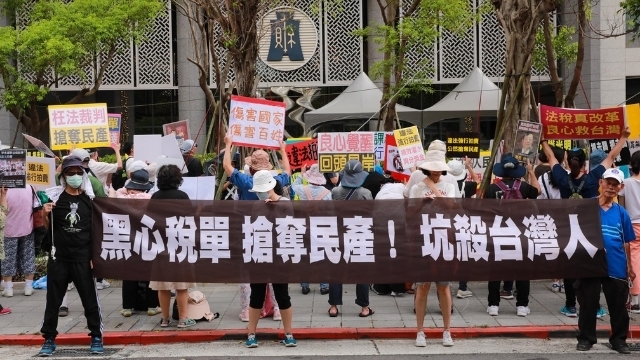10/19/2021 FRANCISCO TENORIO
Universal principles of qualified tax immunity for spiritual organizations should be applied to the case of Tai Ji Men.
by Francisco Tenorio
A paper presented at the webinar “There Is No Peace Without Justice: The Fight of Dr. Hong and the Tai Ji Men case,” co-organized by CESNUR and Human Rights Without Frontiers on September 20, 2021.

On September 7, 2021, which curiously coincided with the celebration of the 199th anniversary of the proclamation of the independence of the Brazilian Empire, I received an invitation from Massimo Introvigne to participate in an event about the Tai Ji Men case. With my team, I reviewed the material on Tai Ji Men published by CESNUR and Bitter Winter.
What struck me the most was the Taiwanese bureaucrats’ strategy of trying to combat the growth of the Tai Ji Men movement by means of a kind of “punishment” or “penalty” imposed on the institution.
That is why I would like to briefly mention the debates that exist in the Brazilian context and that can serve as a defensive thesis to challenge this persecution, among other things because the three legal principles applied in the cases I will mention exist in the legal systems of almost all democratic countries in the world.
First point. There is an historical reason why the institute of fiscal immunity for spiritual organizations was born in law.
In ancient times, the figure of immunity of the temples and priests was due to the close connection that existed between the figure of the deity and the ruler, since the ancient state was essentially theocratic. An example of tax immunity resulting from this blending of state and religion is cited in the Biblical text of Genesis, when it narrates that in the times when Joseph was governor of Egypt, the priests of the Pharaoh possessed a portion of wealth given by the monarch and were exempt from contributing through taxes.
However, following the emergence of the modern secular state, the fiscal immunity of the religious institutions began to have a social foundation, and it seems to have emerged in England. It is linked to the history of the pension system for retirees and of social assistance. Prior to the emergence of the social state and the state pension payment system for retirees, the Christian churches developed a welfare system in which the churches were able to provide social assistance. The churches set up funds to support the elderly and infirm who had no potential to survive by themselves. This was the “embryo” of the modern pension/retirement systems.
The fact that the churches fulfilled a state function of providing help to the poorest of the poor, and carried out assistance and social work with the resources that they had, was the main basis that led modern secular states to grant tax immunity to religious and spiritual institutions.
The best example of fiscal immunity of a religious institution is the immunity of the Catholic confraternities, since they are institutions whose purpose is charity through the maintenance of nursing homes, nurseries, orphanages, hospitals, etc. Eventually, tax immunity was recognized also to missionary agencies, which perform evangelistic as well as social work on behalf of the needy, and here we can cite the example of the Open Doors Ministry, whose purpose is to provide assistance to Christians in the countries where there is religious persecution against them. Spiritual help also benefits citizens and should be recognized by the state.
If an organization is genuinely providing spirituality, since any repressive fiscal practice of the State against spirituality is not legitimate, we can conclude that repressive fiscal practices against that institution are not legitimate.
It is clear to me that Tai Ji Men offers spirituality and promotes self-cultivation and other activities that are beneficial to the citizens. As a consequence, gifts given by members to the organization or the Master should be regarded as not taxable.
Second point. In Brazil, we had a law proposal called Proposal 38723 presented to the Federal Senate to put an end to the benefit of tax immunity for religious and spiritual institutions. The argument used was that many religious leaders (in particular, the leaders of some Evangelical churches with a neo-Pentecostal orientation) availed themselves of the tax immunity benefit of the institutions they directed to commit tax evasion and money-laundering offenses for their private benefit.
However, the solution for these cases is not to revoke the institute of tax immunity for spiritual institutions, but to regulate it to make sure that it fulfills its social function. If some of the leaders of these institutions use improperly the tax benefits for their own enrichment, they should be punished. However, Proposal 38723 was finally rejected as a consensus emerged that it would not be fair to punish all spiritual organizations for the wrongdoing of the leaders of a few of them.
Worse still, there was the risk that under the false pretext of “controlling” and combating the illicit use of the institute of tax immunity, the government may in fact crack down on spiritual movements some politicians do not like.
It seems to me that this is exactly what happened in the Tai Ji Men cause. Under the pretext of combating “religious frauds,” Taiwan’s government has used its power of withholding tax immunity and repressing tax evasion as a form of retaliation after Tai Ji men refused to compromise and renounce its core principles and values to please the dominant political group.
This is something that should be denounced through massive communication through social networks and international fora, asking the Taiwanese state to respect the principles of impartiality, and also of secularity, which implies that nobody should be discriminated because of religious or spiritual ideas, attitudes, or preferences.

Third point. When they want to tax spiritual organizations, states have a tendency to say that they are in fact not religious or spiritual, and should not be on the list of the spiritual groups that enjoy qualified immunity from taxation.
In Brazil, we had a long court case about Freemasonry, because, although it is an institution which claimed the tax benefit granted to spiritual groups, it is not exactly a religious or spiritual institution, and in its constitutive statute it says this explicitly. Many of its members are also affiliated with churches and temples of different religions. Therefore, the Brazilian courts have denied Freemasonry the benefit of tax immunity as a religious or spiritual organization. Of course, the state cannot evaluate the beliefs of a group. It can only state whether they are part of spirituality or religion.
The case of Tai Ji Men is clearly different. It is true that Tai Ji Men, like Freemasonry in Brazil, has disciples (dizi) who maintain their individual religious faith and are not required to convert to Taoism, although Taoism is the source of inspiration for Tai Ji Men. However, even in Brazil it would be recognized that the case of Tai Ji Men is different. Tai Ji Men is a spiritual institution, since its members come together to learn teachings and practices related to spirituality.
Therefore, Tai Ji Men is an institution within the field of spirituality, which means that gifts given by dizi to their Master are not taxable. By denying this, the Taiwanese state has used its supervisory power in the tax field as a means to
violate the principles of impartiality and secularity, which imply that the state cannot take sides and should treat all forms of spirituality equally and impartially. In fact, tax bills have been used as an instrument of discrimination and persecution of Tai Ji Men.
Based on these three points of my analysis, I would conclude with a message for Tai Ji Men and one for the authorities in Taiwan. The government of Taiwan should solve the Tai Ji Men case in accordance with the universally recognized principle of qualified tax immunity for spiritual communities. And Tai Ji Men deserves our gratitude and support for what they do on behalf of religious freedom and tax justice.
Source: Bitter Winter
